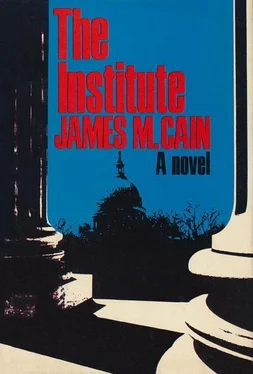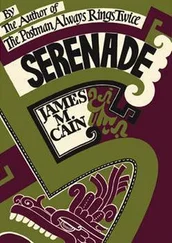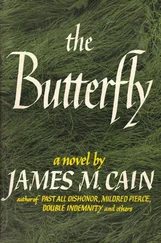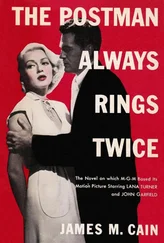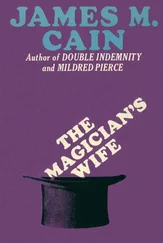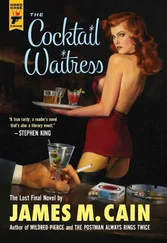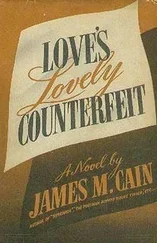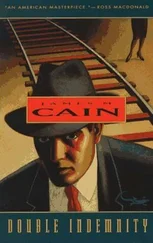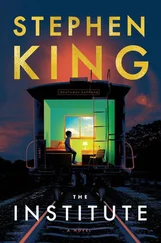James M. Cain
The Institute
I first met Hortense Garrett at her home in Wilmington, Delaware on a spring morning last year. I wasn’t calling on her but on her husband, Richard Garrett, the financier, to make a pitch for money — a lot of money, twenty million or so. It was for a project I had in mind, an institute of biography which I hoped he would endow — and, incidentally, name me as director.
Promptly at ten, as my appointment called for, I went up to the top deck of the Newcastle Arms, the apartment house where he lived, first by express to the fifteenth floor and then in a private elevator to the twentieth. I rang the bell marked GARRETT and was let in by a Swedish maid who first asked my name through a peephole. After taking my hat and coat she showed me into the living room — or drawing room, I suppose one would call it, that was big going on gigantic.
“I tell Mr. Garrett you here,” she said and left, while I started looking around. And there was plenty to look at. First, there was a view of the Delaware River and what looked like half the state of New Jersey, which was nothing short of breathtaking. Next, there were furnishings of an unusual kind: a big, rich, overstuffed sofa and chairs, all in a uniform light beige; tables, cabinets, and knickknacks in dark mahogany; and two oriental rugs placed edge to edge, which carpeted the floor comfortably, yet left some hardwood showing. Around the walls were pictures, all by the same artist, apparently. There were woodland scenes with streams running through and sunlit roads with trees shading them.
It was overwhelming, yet at the same time homelike, perhaps because of the sentimental look of the pictures. But in the midst of my tour of inspection, this girl came whirling into the room with her hand outstretched. She was in her midtwenties, medium-sized but verging on small, with nice contours. Her features, though stubby, had shadows high on the cheeks. Her hair was a tawny blonde, about the color of cornhusks, and her eyes had an odd way of looking at me, sort of half-closed. She was wearing a bottle-green pantsuit that helped the green of her eyes, with a blouse under the jacket that was pulled slightly tight in front.
“Dr. Palmer,” she announced, “I’m Mrs. Garrett. My husband will be with you directly. He apologizes for making you wait, but a call just came in from Paris and he felt he should take it.”
I was taken by surprise. Who’s Who in America gave his age as forty-one, and though it mentioned his marriage, I wasn’t prepared for a girl who looked even younger than I was, which was twenty-eight at the time.
I took her hand and said: “Mrs. Garrett, if it means the delight of your company, I hope his call goes on and on and on.”
“That’s a very pretty speech.”
“To a very pretty girl.”
We both laughed, then she asked how well I knew Senator Hood of Nebraska who had introduced me over the phone and set up my appointment with Mr. Garrett.
“Not very well,” I said, “but a lot better than casually. I was able to help him once when his boy got in trouble with the law, and a senator never forgets. Also, a senator’s wife is not indifferent to a young man with a dinner jacket.”
“Oh my, God’s perfect gift to the hostess.”
To change the subject, I asked who the artist was.
“Wallace Nutting. A friend of my husband’s father. They’re nice watercolors but no better than that, really. Nutting was the greatest furniture-maker this country ever produced, though — or at least, so my husband thinks.” She waved toward the mahogany things, which even I could see were quite special.
Mrs. Garrett motioned me to a seat on one of the sofas facing the fireplace and took her place on the other, facing me. The way she sat highlighted her blouse and what was inside it, so I only half-paid attention as she resumed talking about Senator Hood and how close her husband and the senator were.
Suddenly Mr. Garrett walked into the room, apologizing for keeping me waiting. He was tall, almost as tall as I am, which is six-feet-one, gray-haired and rawboned. He had on a sweatshirt and slacks. His eyes were a watery gray, his voice a toneless drone. And yet his manner was friendly enough, even more than had been necessary in order to comply with protocol for seeing a young college professor who had been introduced by a United States senator.
Mr. Garrett explained that he had to take the call from Paris, “on account of the time differential — they stay up all night to call at an hour that’s convenient for me, so I can’t just give them the brush.” He kept looking at me, then suddenly asked: “Dr. Palmer, have we met before?”
“Well... have we, Mr. Garrett?” To say “not as I recall” wouldn’t have been very friendly, but to fake something would have been worse. I couldn’t recall ever having laid eyes on him, though. Mr. Garrett shot another couple of glances at me. Months later, it became clear where and how I had met him, why he had remembered and I had not; but for now he cut it off and switched to what I’d come about. “An institute of biography, the senator said. I’ll admit, just hearing that much about it, I’m intrigued. So let’s have the details.” When he had sat down beside his wife on the sofa and I had resumed my seat, he continued: “I’ve asked my wife to join us because in a matter like this, it shouldn’t be my decision alone. Unless she shares my enthusiasm, I won’t undertake it.”
“I’m sure I’m going to.”
We all laughed, and he motioned for me to get going. So I gave it the works. I talked about the American preeminence in biography, waving the flag quite a lot as he began to nod his head. I mentioned the strange academic indifference to it, “there being no courses in it as, at least as far as I know. It’s not what’s called a discipline anywhere.” Warming to the subject, I spoke of the various ways an institute could help the biographer, “for example, by claiming a half-dozen study rooms in Archives and the Library of Congress.”
“You’d be based in Washington, then?”
“I would think so, yes.”
“Just wanted to know. Go on.”
“We could assign those rooms ourselves without going through the bureaucratic rigamarole, one of the nuisances a writer runs into nowadays.” I mentioned the microfilm room I thought we should have, “with a battery of Recordak readers available at all times.” He seemed to know about these and nodded. “Also,” I said, “and quite importantly, we’d maintain a taping studio on the order of the Department of Oral History that Allen Nevins started at Columbia, where our writers could put their subjects on some kind of permanent record. And I think we should provide genealogy researchers to ease that kinky angle all biographers dread and yet can’t sidestep — what a lift that would be.”
“What about cash grants?”
“Oh, grants-in-aid will be necessary. In fact, they will be desperately needed. You have no idea how expensive biography is.”
He got up, found a clipboard in the escritoire, stuck some paper in it, and began taking notes with a ballpoint pen. He studied them as I sat across from him, watching. I had the excited feeling that I had scored.
“Dear?” he asked his wife. “What do you think? Does it interest you at all?”
“Oh definitely... Yes, it thrills me.”
That’s what she said, but it had a phoney ring; and if I noticed it, so did he. He studied her for a moment and then growled: “Well? What don’t you like about it?”
“But I do like it, Richard,” she exclaimed. “I think it’s wonderful. And I know, myself, that they don’t have the courses in it. You forget, dear; I was a teaching assistant at Delaware U where I found out some things — a lot of things, things most people don’t know.”
Читать дальше
